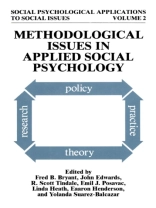Many authors have argued that applying social psychology to the solution of real- world problems builds better theories. Observers have claimed, for example, that of human behavior applied social psychology reveals more accurate principles because its data are based on people in real-life circumstances (Helmreich, 1975; Saxe & Fine, 1980), provides an opportunity to assess the ecological validity of generalizations derived from laboratory research (Ellsworth, 1977; Leventhal, 1980), and discloses important gaps in existing theories (Fisher, 1982; Mayo & La France, 1980). Undoubtedly, many concrete examples can be mustered in support of these claims. But it also can be argued that applying social psychology to social issues and problems builds better research methods. Special methodological problems arise and new perspectives on old methodological problems emerge when re- searchers leave the laboratory and tackle social problems in real-world settings. Along the way, we not only improve existing research techniques but also devel- op new research tools, all of which enhance our ability to obtain valid results and thereby to understand and solve socially relevant problems. Indeed, Campbell and Stanley’s (1966) seminal work on validity in research design grew out of the application of social science in field settings. In this spirit, the principal aim of this volume is to present examples of methodological advances being made as researchers apply social psychology in real-life settings.
Fred B. Bryant & John Edwards
Methodological Issues in Applied Social Psychology [PDF ebook]
Methodological Issues in Applied Social Psychology [PDF ebook]
Dieses Ebook kaufen – und ein weitere GRATIS erhalten!
Sprache Englisch ● Format PDF ● ISBN 9781489923080 ● Herausgeber Fred B. Bryant & John Edwards ● Verlag Springer US ● Erscheinungsjahr 2013 ● herunterladbar 3 mal ● Währung EUR ● ID 4663497 ● Kopierschutz Adobe DRM
erfordert DRM-fähige Lesetechnologie












